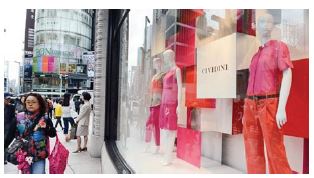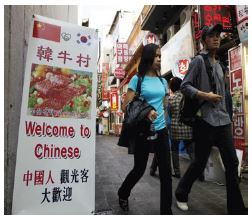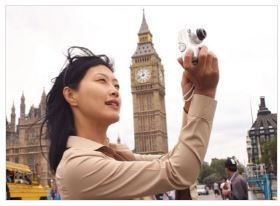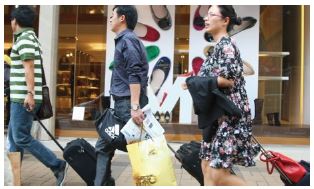RMB MATTERS
There are concerns that the recent devaluation of the renminbi will hinder Chinese tourists who might plan to travel abroad. However, since the currency is under a managed floating exchange rate, its recent devaluation has been significantly smaller than other currencies’ devaluation against the strong US dollar. Since the Hong Kong dollar is pegged to the US dollar, retail sales in Hong Kong have weakened since early 2014, when the US dollar started strengthening—and many Chinese tourists have switched from shopping in Hong Kong to shopping further abroad.

Passengers at Suzhou railway station in east China's Jiangsu province on Monday as they head home after the week-long National Day holiday. Source: Xinhua
Japan has seen the greatest increase in Chinese shoppers, closely followed by Europe. Both Japan and the eurozone are in stimulus mode and both of their currencies have weakened versus the US dollar. The UK has fallen behind on sales growth, as the British pound has remained comparatively stronger against the US dollar. Compared to the start of 2014, the Japanese yen has weakened by approximately 14% against the US dollar, while the euro has weakened by approximately 23% and the pound by approximately 10%.
 Hong Kong
Hong Kong
Contradicting what the local Hong Kong government and the Chinese government have been emphasizing since late 2014, the total number of Mainland Chinese visitors to Hong Kong increased by 0.8%, year over year, from January through August 2015. During the same period, the number of same-day visitors increased by 5.7%, reaching 60.89% of total Chinese visitors, according to the Hong Kong Tourism Board and data from the Immigration Department. The strong Hong Kong dollar (caused by the strong US dollar) is the only reason retail sales in Hong Kong have fallen, and luxury retailers have suffered the most.
Local industry players in Hong Kong are projecting the number of visitors from Mainland China to drop by 3%–10%. However, these local players and government officials both underestimated the number of Chinese visitors who would visit Hong Kong last October: the number actually jumped by 18.3% compared to October 2013, and exceeded 4 million visitors. Even if the number of visitors falls by 10%, at the high end of the projected range, Hong Kong will still see five times more Chinese visitors than Japan will in October.
 Japan
Japan
[caption id="attachment_73221" align="alignright" width="314"]

A Department stores in Tokyo. Source: Xinhua[/caption]
Japan has been the second-most popular destination for Chinese tourists since the beginning of 2015, thanks largely in part to the weak yen. The yen has not fallen as much as the euro has since January 2014, however, it was as strong as ¥86.6 /US$1 on January 2, 2013. In October last year, 223,000 Chinese visited Japan, an 84.3% increase over October 2013. According to the Japan
National Tourism Organization, the number reached 592,000 August 2015 (latest available data). October 2013. According to the Japan National Tourism Organization, the number reached 592,000 August 2015 (latest available data). In Japan, retailers from luxury purveyors to drugstores to electronics stores to duty-free stores all benefit from an influx of Chinese tourists. Brands such as Hermès and Prada have seen sales growth in Japan, duty-free stores have expanded into city centers, and drugstores have been flooded by Chinese tourists shopping for medicines, diapers and beauty products. Japan has basically captured all of the luxury shoppers that Hong Kong has lost. Based on the number of Hong Kong’s same-day visitors, however, it appears that the number of Chinese tourists shopping for necessities in Japan has simply increased, rather than benefited from tourists switching from Hong Kong to Japan in order to buy necessities.
 South Korea
South Korea

According to the Nikkei Asian Review, South Korea is seeing fewer Chinese tourists than Japan is for the first time this year in recent years. Korea has been the perennial frontrunner since the rise of Korean pop culture in the first decade of the 21st century: 2.4 million people visited Korea in 2010, versus 1.3 million to Japan. The outbreak of Middle East respiratory syndrome in May contributed to a fall in tourism for three straight months, but the number of visitors resumed its upward trend in September. There were 2.2 million Chinese visitors to Korea in the first seven months of 2015, versus 2.8 million to Japan. The Korean won has weakened by 12.6% against the US dollar since January 2014. Apparel and beauty retailers in Korea can expect improved sales thanks to Chinese visitors this Golden Week.
 Switzerland
Switzerland
Though not a traditional shopping destination, Switzerland enjoyed a 32.8% year-over-year increase in overnight stays by Chinese tourists from January through July 2015. Jungfrau Railways CEO Urs Kessler expects about 1,000 Chinese guests per day during the October Golden Week, approximately twice as many as usual. The Swiss franc has weakened by 9.7% versus the US dollar since January 2014.
 France
France
Among the eurozone countries, France benefits the most from Chinese tourists, as it is home to many luxury brands and wines. According to a survey by the Financial Times earlier this year, France remains Chinese tourists’ dream overseas destination. France received 2.2 million Chinese visitors in 2014, up from 1.7 million in 2013. In the first half of this year, Paris alone reported a 49% increase in its number of Chinese visitors. In May, a Chinese billionaire took more than 6,000 employees to visit France.
 UK
UK

Payment services provider Sage Pay predicts that this year UK retailers will see an 18% increase in spending over Golden Week by Chinese tourists over last year, and UK retailers can expect £600 million to flood to the high street. In general, however, the UK is a less popular tourist destination than many of its European counterparts, given its strong economy and strong currency. The pound has weakened by 9.5% against the US dollar since January 2014. It is now trading at £1/€1.3552, compared to £1/€1.2044 on January 2, 2014,
 US
US

The strong US dollar has had a negligible impact on Chinese tourists, as the renminbi is traded under a managed floating rate. Chinese visitors to the US numbered 2.2 million in 2014; however, an easing of the visa policy in November last year helped boost the number this year. According to Ctrip, the number of Chinese applying for visas through the company from January through August this year increased threefold compared to last year. And the number of Chinese visitors to the US is expected to rise even further, as President Xi Jinping announced in Seattle on September 22 that China and the US will hold a China-US Tourism Year in 2016.
Number of Tourists Expected to Increase Despite Market Crash

According to surveys conducted in China, the number of Golden Week tourists to all hot destinations throughout Asia, Europe and the US is expected to increase this year. The number of overnight visitors to Hong Kong is expected to decrease, which will lead directly to a fall in retail sales, but the number of same-day Chinese visitors to Hong Kong has actually increased for the year to date. Given the strength of the renminbi against all major currencies, and since it is traded under a managed floating rate against the US dollar, all countries can expect a strong increase in retail sales from Chinese tourists traveling during Golden Week this October.


 Hong Kong
Hong Kong Japan
Japan A Department stores in Tokyo. Source: Xinhua[/caption]
Japan has been the second-most popular destination for Chinese tourists since the beginning of 2015, thanks largely in part to the weak yen. The yen has not fallen as much as the euro has since January 2014, however, it was as strong as ¥86.6 /US$1 on January 2, 2013. In October last year, 223,000 Chinese visited Japan, an 84.3% increase over October 2013. According to the Japan
National Tourism Organization, the number reached 592,000 August 2015 (latest available data). October 2013. According to the Japan National Tourism Organization, the number reached 592,000 August 2015 (latest available data). In Japan, retailers from luxury purveyors to drugstores to electronics stores to duty-free stores all benefit from an influx of Chinese tourists. Brands such as Hermès and Prada have seen sales growth in Japan, duty-free stores have expanded into city centers, and drugstores have been flooded by Chinese tourists shopping for medicines, diapers and beauty products. Japan has basically captured all of the luxury shoppers that Hong Kong has lost. Based on the number of Hong Kong’s same-day visitors, however, it appears that the number of Chinese tourists shopping for necessities in Japan has simply increased, rather than benefited from tourists switching from Hong Kong to Japan in order to buy necessities.
A Department stores in Tokyo. Source: Xinhua[/caption]
Japan has been the second-most popular destination for Chinese tourists since the beginning of 2015, thanks largely in part to the weak yen. The yen has not fallen as much as the euro has since January 2014, however, it was as strong as ¥86.6 /US$1 on January 2, 2013. In October last year, 223,000 Chinese visited Japan, an 84.3% increase over October 2013. According to the Japan
National Tourism Organization, the number reached 592,000 August 2015 (latest available data). October 2013. According to the Japan National Tourism Organization, the number reached 592,000 August 2015 (latest available data). In Japan, retailers from luxury purveyors to drugstores to electronics stores to duty-free stores all benefit from an influx of Chinese tourists. Brands such as Hermès and Prada have seen sales growth in Japan, duty-free stores have expanded into city centers, and drugstores have been flooded by Chinese tourists shopping for medicines, diapers and beauty products. Japan has basically captured all of the luxury shoppers that Hong Kong has lost. Based on the number of Hong Kong’s same-day visitors, however, it appears that the number of Chinese tourists shopping for necessities in Japan has simply increased, rather than benefited from tourists switching from Hong Kong to Japan in order to buy necessities.
 South Korea
South Korea According to the Nikkei Asian Review, South Korea is seeing fewer Chinese tourists than Japan is for the first time this year in recent years. Korea has been the perennial frontrunner since the rise of Korean pop culture in the first decade of the 21st century: 2.4 million people visited Korea in 2010, versus 1.3 million to Japan. The outbreak of Middle East respiratory syndrome in May contributed to a fall in tourism for three straight months, but the number of visitors resumed its upward trend in September. There were 2.2 million Chinese visitors to Korea in the first seven months of 2015, versus 2.8 million to Japan. The Korean won has weakened by 12.6% against the US dollar since January 2014. Apparel and beauty retailers in Korea can expect improved sales thanks to Chinese visitors this Golden Week.
According to the Nikkei Asian Review, South Korea is seeing fewer Chinese tourists than Japan is for the first time this year in recent years. Korea has been the perennial frontrunner since the rise of Korean pop culture in the first decade of the 21st century: 2.4 million people visited Korea in 2010, versus 1.3 million to Japan. The outbreak of Middle East respiratory syndrome in May contributed to a fall in tourism for three straight months, but the number of visitors resumed its upward trend in September. There were 2.2 million Chinese visitors to Korea in the first seven months of 2015, versus 2.8 million to Japan. The Korean won has weakened by 12.6% against the US dollar since January 2014. Apparel and beauty retailers in Korea can expect improved sales thanks to Chinese visitors this Golden Week.
 Switzerland
Switzerland France
France UK
UK Payment services provider Sage Pay predicts that this year UK retailers will see an 18% increase in spending over Golden Week by Chinese tourists over last year, and UK retailers can expect £600 million to flood to the high street. In general, however, the UK is a less popular tourist destination than many of its European counterparts, given its strong economy and strong currency. The pound has weakened by 9.5% against the US dollar since January 2014. It is now trading at £1/€1.3552, compared to £1/€1.2044 on January 2, 2014,
Payment services provider Sage Pay predicts that this year UK retailers will see an 18% increase in spending over Golden Week by Chinese tourists over last year, and UK retailers can expect £600 million to flood to the high street. In general, however, the UK is a less popular tourist destination than many of its European counterparts, given its strong economy and strong currency. The pound has weakened by 9.5% against the US dollar since January 2014. It is now trading at £1/€1.3552, compared to £1/€1.2044 on January 2, 2014,
 US
US The strong US dollar has had a negligible impact on Chinese tourists, as the renminbi is traded under a managed floating rate. Chinese visitors to the US numbered 2.2 million in 2014; however, an easing of the visa policy in November last year helped boost the number this year. According to Ctrip, the number of Chinese applying for visas through the company from January through August this year increased threefold compared to last year. And the number of Chinese visitors to the US is expected to rise even further, as President Xi Jinping announced in Seattle on September 22 that China and the US will hold a China-US Tourism Year in 2016.
The strong US dollar has had a negligible impact on Chinese tourists, as the renminbi is traded under a managed floating rate. Chinese visitors to the US numbered 2.2 million in 2014; however, an easing of the visa policy in November last year helped boost the number this year. According to Ctrip, the number of Chinese applying for visas through the company from January through August this year increased threefold compared to last year. And the number of Chinese visitors to the US is expected to rise even further, as President Xi Jinping announced in Seattle on September 22 that China and the US will hold a China-US Tourism Year in 2016.
 According to surveys conducted in China, the number of Golden Week tourists to all hot destinations throughout Asia, Europe and the US is expected to increase this year. The number of overnight visitors to Hong Kong is expected to decrease, which will lead directly to a fall in retail sales, but the number of same-day Chinese visitors to Hong Kong has actually increased for the year to date. Given the strength of the renminbi against all major currencies, and since it is traded under a managed floating rate against the US dollar, all countries can expect a strong increase in retail sales from Chinese tourists traveling during Golden Week this October.
According to surveys conducted in China, the number of Golden Week tourists to all hot destinations throughout Asia, Europe and the US is expected to increase this year. The number of overnight visitors to Hong Kong is expected to decrease, which will lead directly to a fall in retail sales, but the number of same-day Chinese visitors to Hong Kong has actually increased for the year to date. Given the strength of the renminbi against all major currencies, and since it is traded under a managed floating rate against the US dollar, all countries can expect a strong increase in retail sales from Chinese tourists traveling during Golden Week this October.